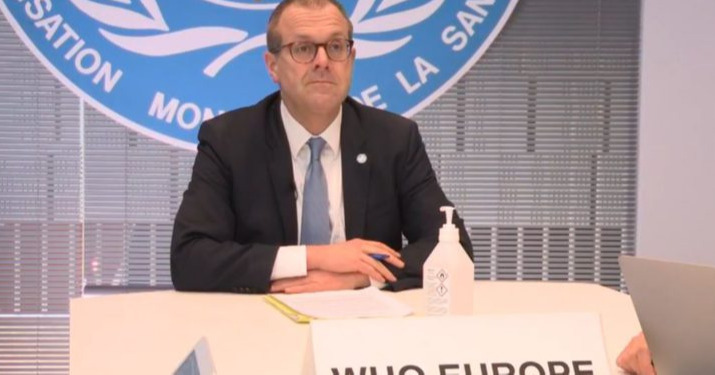
World Health Organization Europe Director Hans Kluge
Copenhagen, July 2 (RHC)-- A third wave of infections is now inevitable unless citizens and legislators are “disciplined,” the World Health Organization (WHO) warns, saying a 10-week decline in new coronavirus infections across Europe has come to an end.
The number of new cases across Europe rose by 10 percent last week, the UN health agency’s regional director for Europe Hans Kluge told a news briefing on Thursday in Copenhagen, Denmark.
The WHO’s 53-nation European region includes all 27 member states of the European Union, the United Kingdom, Russia, Turkey, several Central Asian nations, and Israel. Kluge said the uptick in infections was driven by increased mixing, travel, gatherings, and easing of social restrictions, as countries throughout the region edge out of lockdown measures.
“This is taking place in the context of a rapidly evolving situation. A new variant of concern – the Delta variant – and in a region where, despite tremendous efforts by member states, millions remain unvaccinated,” he said, citing the strain first discovered in India. “There will be a new wave in the WHO European region unless we remain disciplined.”
Kluge cautioned the highly infectious Delta variant was on track to become the dominant strain in WHO’s Europe region by August. He said vaccines were not being rolled out with enough efficiency to offer the necessary protection amid the surge, with 63 percent of people in the region yet to receive a first dose.
Vaccines have been shown to offer some protection against the Delta variant, but a higher level requires two doses. Marco Cavaleri, head of vaccine strategy at the European Medicines Agency, told a news conference on Thursday: “Emerging data from real-world evidence are showing that two doses of vaccines are protective against the Delta variant.”
Kluge said the average vaccine coverage in the European region was 24 percent. Half of elderly people and 40 percent of healthcare workers were still unprotected, he said. “That is unacceptable, and that is far from the recommended 80 percent coverage of the adult population,” he told reporters.
“The three conditions for a new wave of excess hospitalisations and deaths before the autumn are therefore in place: New variants, deficit in vaccine uptake, increased social mixing.” Kluge advised people who want to travel and gather over the European summer to continue “life-saving reflexes” such as wearing masks.
His appeal came as the EU on Thursday launched a digital COVID certificate system designed to help people travel more freely across the 27-nation bloc and open up summer tourism. The document – essentially a QR code – is free to obtain and will show whether the bearer is fully vaccinated with one of the EU’s four approved jabs, made by Pfizer-BioNTech, Moderna, AstraZeneca and Johnson & Johnson.
It will also indicate if a person has recovered from COVID, or has a recent negative test result, and will be issued and valid in all EU countries, set out in the national language and in English.

